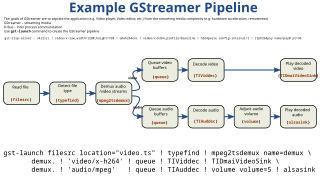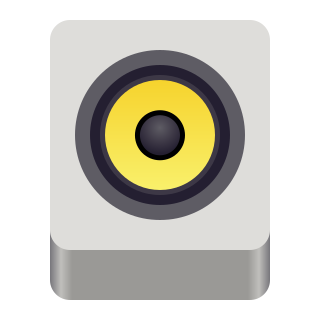Monkey's Audio is an algorithm and file format for lossless audio data compression. Lossless data compression does not discard data during the process of encoding, unlike lossy compression methods such as Advanced Audio Coding, MP3, Vorbis, and Opus. Therefore, it may be decompressed to a file that is identical to the source material.

Gambas is the name of an object-oriented dialect of the BASIC programming language, as well as the integrated development environment that accompanies it. Designed to run on Linux and other Unix-like computer operating systems, its name is a recursive acronym for Gambas Almost Means Basic. Gambas is also the word for prawns in the Spanish, French, and Portuguese languages, from which the project's logos are derived.

Renoise is a digital audio workstation (DAW) based upon the heritage and development of tracker software. Its primary use is the composition of music using sound samples, soft synths, and effects plug-ins. It is also able to interface with MIDI and OSC equipment. The main difference between Renoise and other music software is the characteristic vertical timeline sequencer used by tracking software.

GStreamer is a pipeline-based multimedia framework that links together a wide variety of media processing systems to complete complex workflows. For instance, GStreamer can be used to build a system that reads files in one format, processes them, and exports them in another. The formats and processes can be changed in a plug and play fashion.

Rhythmbox is a free and open-source audio player software, tag editor and music organizer for digital audio files on Linux and Unix-like systems.

Ubuntu is a Linux distribution based on Debian and composed mostly of free and open-source software. Ubuntu is officially released in multiple editions: Desktop, Server, and Core for Internet of things devices and robots. The operating system is developed by the British company Canonical, and a community of other developers, under a meritocratic governance model. As of October 2023, the most-recent release is 23.10, and the current long-term support release is 22.04.
Technical variations of Linux distributions include support for different hardware devices and systems or software package configurations. Organizational differences may be motivated by historical reasons. Other criteria include security, including how quickly security upgrades are available; ease of package management; and number of packages available.

LiVES (LiVES Editing System) is a free and open-source video editing software and VJ tool, released under the GNU General Public License version 3 or later. There are binary versions available for most popular Linux distributions (including Debian, Ubuntu, Fedora, Suse, Gentoo, Slackware, Arch Linux, Mandriva and Mageia). There are also ports for BSD, and it will run under Solaris and IRIX. It has been compiled under OS X Leopard, but not thoroughly tested on that platform. In early 2019, a version for Microsoft Windows was announced, with a release slated for in the second half of 2019.

Music On Console (MOC) is an ncurses-based console audio player for Linux/UNIX. It was originally written by Damian Pietras, and is currently maintained by John Fitzgerald. It is designed to be powerful and easy to use, with an interface inspired by the Midnight Commander console file manager. The default interface layout comprises a file list in the left pane with the playlist on the right. It is configurable with customizable key bindings, color schemes and interface layouts. MOC comes with several themes defined in text files, which can be modified to create new layouts. It supports ALSA, OSS or JACK outputs.

Audacious is a free and open-source audio player software with a focus on low resource use, high audio quality, and support for a wide range of audio formats. It is designed primarily for use on POSIX-compatible Unix-like operating systems, with limited support for Microsoft Windows. Audacious was the default audio player in Ubuntu Studio in 2011–12, and was the default music player in Lubuntu until October 2018, when it was replaced with VLC.

PulseAudio is a network-capable sound server program distributed via the freedesktop.org project. It runs mainly on Linux, including Windows Subsystem for Linux on Microsoft Windows and Termux on Android; various BSD distributions such as FreeBSD, OpenBSD, and macOS; as well as Illumos distributions and the Solaris operating system. It serves as a middleware in between applications and hardware and handles raw PCM audio streams.

LMMS is a digital audio workstation application program. It allows music to be produced by arranging samples, synthesizing sounds, entering notes via computer keyboard or mouse or by playing on a MIDI keyboard, and combining the features of trackers and sequencers. It is free and open source software, written in Qt and released under GPL-2.0-or-later.

Buzztrax is a free software project designed to create a clone of the Buzz music composer. Its functionality is to preserve the playability of the compositions made with Buzz. Songs are made by adding virtual sound generators and effects, connecting them, recording short musical phrases and arranging them in the sequencer. For distribution, songs can be exported to common audio formats such as OGG, MP3, WAV and many others.
OggConvert is a free and open-source transcoder for digital audio and video files of various types into the free Ogg Vorbis audio format, and the Theora, VP8 and Dirac video formats. It supports Ogg, Matroska and WebM containers for output. It is developed by a single author, primarily for Linux. A number of community translations exist for the software.

Qmmp is a free and open-source cross-platform audio player that is similar to Winamp. It is written in C++ using the Qt widget toolkit for the user interface. It officially supports the operating systems Linux, FreeBSD and Microsoft Windows. In most Linux distributions, it is available through the standard package repositories. Until Audacious switched to Qt in version 4.0, qmmp was the only audio player to use Qt and not feature a database.

SparkyLinux is a desktop-oriented operating system based on the Debian operating system. The project offers a ready to use operating system with various desktops to choose from. SparkyLinux is released 3-4 times per year to provide the latest versions of all applications.

GNOME SoundConverter is an unofficial GNOME-based free and open-source transcoder for digital audio files. It uses GStreamer for input and output files. It has multi threaded design and can also extract the audio from video files.

DeaDBeeF is an audio player software available for Windows, Linux and other Unix-like operating systems. An ad-supported Android version is available, but has not been updated since 2017. DeaDBeeF is free and open-source software, except on Android.













